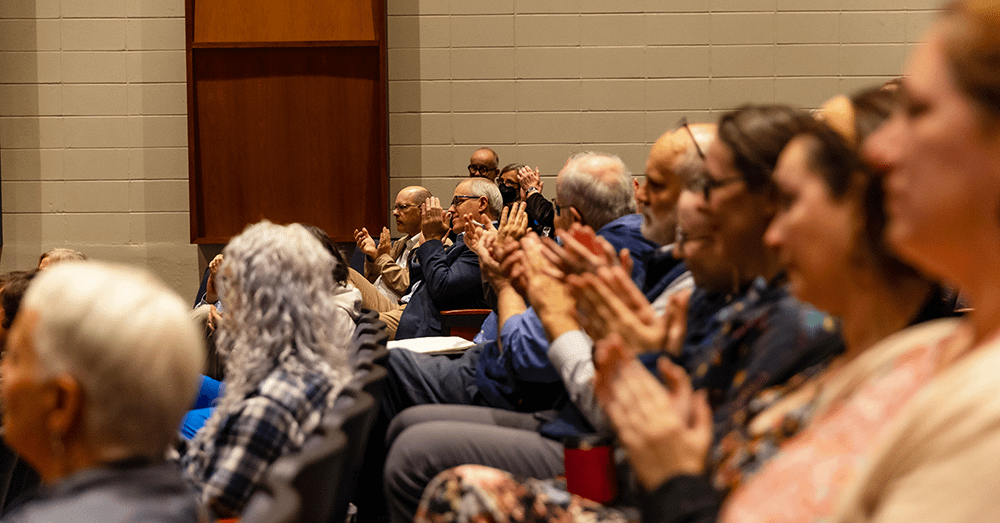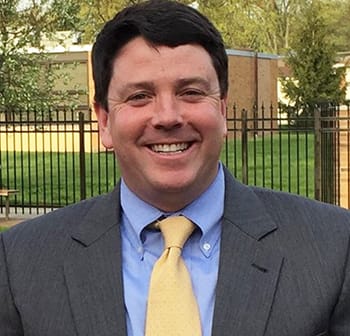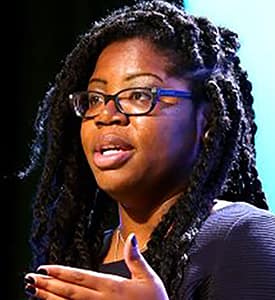Final research lunch fuels onward momentum
During their third and final group meal together to check in and report out, this summer’s mentored student researchers at Saint Michael’s College used “Word Garden” rock selections to summarize progress on their projects. Their choices projected a telling impression of a worthwhile and expanding aspect of campus life:
“Selfless….hope…work…science … prevail…can … future … close …travel … ride dedication…blossom … think … story … glad … person ….surprise … time …spike…corn … drive…poncho (a story there, as with all the words) …flow … wonder…care…go … community … beautiful ….discover …”
Explanations were in order, so after their outdoor meal (sandwiches and berry shortcake) in the Emmaus Courtyard — the area walled by St. Edmund’s, Cheray and Jeanmarie Hall — Karen Talentino, vice president for academic affairs, invited students to the nearby Word Garden. Her office sponsors these gatherings. President Jack Neuhauser and supportive faculty mentors and staff joined them there as students selected stones, before taking turns explaining their choices – much as they did at the start of their research journeys in June.
Here’s what some word choices meant to them and their work:
“Enthusiastic” is how Erin Burke ’17, (education, Westford, MA) is feeling now that her interviews, reading and work are “coming together as a final product. “I’m really enthusiastic to see where it goes from here,” she said.
“Selfless” is how Daniel Brogan ‘18 (secondary education/political science, South Dennis MA) regards the high school students he’s been studying who actively influence education policy across the U.S. through their work with various boards and councils. “I’m completely humbled to see countless students working tirelessly to better their environments and community” he said.
“Hope” was the choice of Christopher Toomey ’17 (chemistry, Montague, MA) since he recently sent data to University of Vermont scientists for analysis, and he’s “hoping it comes back as what we want it to be.” Talentino, a scientist herself, speculated that the results he’s hoping for in his study of a protein fusion system for suppression of prostate cancer is “pure protein.” Toomey affirmed she was right.
“Work” for Caroline Staples ’17 (chemistry, Stoughton, MA) referred to all the work she still has to do in her study under faculty mentor David Heroux to synthesize a form of carbon that has high surface area for the remediation of gasoline-based pollutants in groundwater. But, she said, that’s OK with her, since “I’m very excited to continue my research and see where it takes me.”
“Science” was an obvious choice for Emma Timmel ’19 (Environmental Studies, Gotha, FL), who is trying to synthesize biofuel from mixed algae lipids, also under Heroux’s direction. “I feel I’ve gained a better appreciation and understanding of the scientific process and everything that goes into it,” she said.
“Prevail” to Jordan Roach (biology/neuroscience, Bristol, ME), described what he must do now that many of his samples are not going as planned, having “blown up in the oven.” His mentor Heroux hastily corrected him: “Not a real blow-up! — just shooting out of the beaker!” Roach explained: “I had to learn patience, and learned that with it, I’ll prevail in the end.”
“Future,” the choice of Mayra Alvarez’17 (psychology, Mount Vernon, NY), meant “this is just the beginning for me.” Her work with Anthony Richardson in his “virtual reality” lab means “I get to play with the fun stuff…trying to get to see how people react to a virtual environment.” Alvarez looks forward to her next year of continued work in the lab, she said.
Meghan Lavoie’17 (biology/Burlington, VT) chose “travel” for the simple reason that “my projects have traveled the course of two summers” instead of only one as with most of the research.
Lindsay Rogers’18 (psychology, Park Ridge, NJ), studying how sleep affects human health, picked “blossom” since her work is blossoming. “I’m in a really good place, having finished my tests; I have results and am going to start writing a paper. I’m also blossoming as a person, learning about human health and how I want to do that career in my future.”
Natalie Dalimonte’17 (biology, Pomfret Center, CT), chose “think” since her project has made her “think differently” from what she had expected after her results took a different course from her first hypothesis.
Carly Anderson (biology/neuroscience, Whitefish, MT), studying spiders with Ruth Fabian-Fine, selected “glad” since “I had a few stumbling blocks a few weeks ago but things are going smoothly now, after we worked through it, and I’m glad things are working out.” She’s now at the exciting point of drawing conclusions, she said.
A group working on origami folding for dynamic DNA/RNA nanomachines agreed on the word “time” for various reasons, including that breaking up the time in their work days after realizing proper priorities really helped advance their work more efficiently. They also had the word “surprise,” “since we’ve had quite a few,” said Anna Cook’18 (English, Bradford, VT).
“Discover” was the word-choice of Jessica Jamer’18 (American Studies/English, New Ipswich, NH), whose project is titled “American Indians in the Margins: An Inquiry Into Literature as a Foundation for Community-Engaged Learning” with Maura d’Amore of the English faculty. “Through this work I had the ability to discover a whole other section of U.S. history that’s often pushed into the margins,” she said.
Connor Mitchell’17 is creating a “critical incident” case-study for business students on a local food truck called “Beansie’s Bus” in Burlington, guided by Paul Olsen of the business faculty. The idea is to use the case in Saint Michael’s classes. His word “ride” indicated that “it’s been a long ride and we’ve got a way to go still.”
Julia Snyder ’17 (biology/Fairfax, VT) chose the word “care” because, now in a second year with alumni researcher Michal Previs ’99 at UVM, “I care more and more about it and want to see it through to the finish.”
“Go” was the choice of Ben Cohen (environmental studies, Hebron, CT), since, in his work looking at fungal networks that connect plant roots in order to see how adding to soil changes things, “next week we’ll be harvesting plants and after that we will be on the go constantly.”
Jack Longley ’17 (history/political science, Needham, MA) chose “community,” explaining, “one thing I’ve learned studying polis ci is that at the end of the day it really is the study of communities and how they interact with one another and how it interacts with itself.” He finds that particularly true in Northern Ireland, the focus of his study under faculty mentor Michael Bosia of political science.
“Beautiful” was a richly evocative word for Josef Kranz (English major/theater minor, St. Albans, VT). He’s doing a research paper (faculty mentor Christina Root of the English faculty) about the romantic poet John Keats to better see or understand his works within the context of Oscar Wilde’s views on aestheticism. He said he’s seeking to “better appreciate what makes a work beautiful, what we see in the natural world as being beautiful and how that is embodied in a work of art. I think the attempt to better understand beauty in the world and in art is in its own self a beautiful pursuit.”
A less ethereal word choice came from Kaylee Jackson’17 (biology, Saint Albans), a member of the EPSCoR water quality research group under biology’s Declan McCabe: it was “drive” “because we drive almost every day, almost to Canada and down to Montpelier, to collect water samples; and sometimes lack of rain, which we rely on to collect data, has been driving us up the wall this summer!” That desire for a big rain was what inspired another member of that group to chose the word “poncho.” Talentino said she was excited this year that a number of students are working in a group “since group research is quite a different undertaking than working on your own. It’s really a very powerful experience, seeing how you can help and support one another.” She also liked hearing that doing research is helping students decide on courses they might take, and even careers they might pursue. “That’s an important outcome of doing this type of work as an undergraduate,” she said.
Two faculty mentors, Jonathan Silverman of education and Ruth Fabian-Fine of Neuroscience, had the “last words”: they were “thank” and “you,” directed at Talentino and Neuhauser for “inspiring all these wonderful research projects,” said Fabian-Fine “We felt very supported all the time and had a lot of fun, and thought we had some great results so we wanted to say thank you.”





